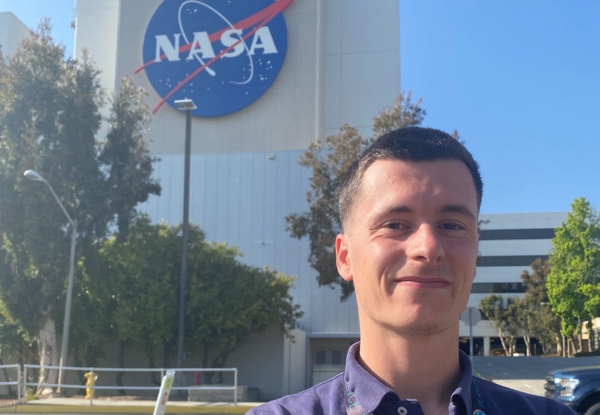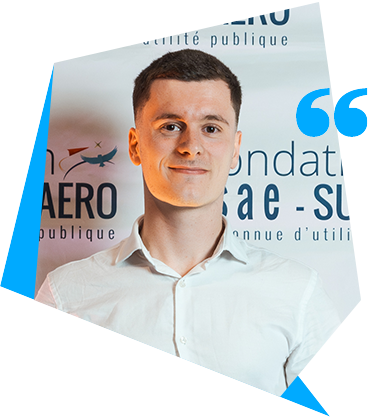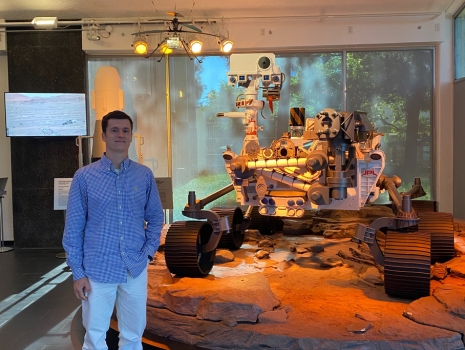< back to articles
5 months at JPL: a turning point for Mathéo
Published on
Mathéo received a grant from the Foundation for a 5-month internship at the Jet Propulsion Laboratory in Caltech, California, USA. This experience gave him an insight into the practical realities of space robotics, and reinforced his motivation to pursue a career in the demanding field of space engineering.
He takes stock of his experience.

Why did you choose to go to JPL?
When I arrived in the United States, I was filled with excitement and curiosity at the prospect of working for such a prestigious institution as NASA’s Jet Propulsion Laboratory (JPL). For me, starting this internship was the culmination of a dream, a decisive step in my career, but above all an invaluable opportunity to get up close and personal with some of the most fascinating projects in space exploration. As a long-time space enthusiast, I was eager to put my skills at the service of this international scientific and technical community. I knew that working on such crucial and innovative projects would strengthen not only my technical skills, but also my global vision of the space field.
How did your arrival at JPL go?
Mathéo Fouchet

My arrival at JPL marked a turning point in my career. Every day, I had the opportunity to meet engineers and scientists involved in cutting-edge projects, from Martian robotic missions to studies of the solar system’s icy moons. The energy and enthusiasm palpable in the corridors were contagious and reinforced my motivation to give my best. This immersion in a highly technical and innovative environment was exactly what I was looking for when I joined JPL.
I’d always dreamed of being involved in projects with such a broad scope, and this opportunity finally allowed me to do just that. Academically, my time at JPL was incredibly rewarding. Very quickly, I was immersed in team meetings where different projects were discussed. I had the opportunity to participate in these exchanges, to learn from the engineers and researchers in place, but also to contribute my own ideas. Every discussion and every project dealt with research topics at the cutting edge of space innovation, which enabled me to broaden my horizons considerably. I quickly developed new skills in data analysis and visualization, including learning to use advanced modeling tools to interpret complex data. Data analysis is an essential area in the space industry, and being able to understand and visualize this information accurately is crucial to ensuring mission success. I not only honed these skills, but also discovered new areas of application, which helped make this experience academically unique.
The public lectures I attended at JPL also played a central role in enriching my stay. I had the opportunity to hear renowned researchers discuss topics such as the in-orbit repair of the Hubble telescope, the Europa Clipper mission, as well as presentations on the Moon and its permanent shadow craters. These sessions gave me an in-depth perspective on the challenges facing today’s space missions. They also gave me a more nuanced understanding of the different facets of space research, from orbital mechanics and robotics to geological and environmental studies. By taking part in these events, I witnessed how science and engineering intertwine to push back the frontiers of human knowledge. It inspired me to consider new directions for my own career, including exploring how I could apply my skills to similar projects in the future.
Do you have a special moment to share with us?
One of the highlights of my stay was a visit to the Mars Yard, where I got a close-up look at the replicas of the Curiosity and Perseverance rovers. Seeing these iconic machines in person, after following their exploits through the media, was a particularly moving experience. I was able to better understand the technical challenges faced by the teams developing these rovers, particularly when it comes to designing robotic systems capable of operating in environments as extreme as Mars. Not only did this experience give me a better grasp of the practical realities of space robotics, it also strengthened my motivation to pursue a career in this field. The complexity and meticulousness required for every aspect of these projects made me realize just how demanding, yet incredibly rewarding, space engineering is.

What do you take away from your stay on a personal level?
On a personal level, my time in California has been a source of considerable enrichment. Living in Pasadena, where JPL is located, gave me the opportunity to discover a different way of life from the one I was used to in Europe. I met many students and professionals from all over the world, each bringing their own experiences and perspectives. These encounters gave me a unique opportunity to exchange views on our respective backgrounds and to compare the educational and professional systems of our home countries. I was particularly interested in the way American interns approached their academic and professional careers, often with a more flexible, experiential approach than in Europe. These discussions enabled me to put my own background into perspective, and to think about how I could integrate some of these ideas into my own career.
California’s cultural diversity was another highlight of my stay. Living in such a cosmopolitan environment allowed me to discover new cultures, sample a variety of cuisines and learn about traditions from all over the world. I found this diversity incredibly enriching, both personally and professionally. Working alongside people from such diverse backgrounds helped me develop a better understanding of multicultural dynamics, which is essential in a sector as globalized as the space industry. These exchanges have also helped me to better understand how different cultures perceive and approach technological and scientific challenges, and how these varied perspectives can enrich teamwork and innovation.
And professionally?
On a professional level, one of the most valuable skills I acquired during my stay was the ability to speak English in a work context. Although I had already used English in academic contexts, this was the first time I had been immersed in a working environment where English was the main language. This immersion enabled me to strengthen my technical communication skills, particularly in complex discussions involving scientific concepts and technical terms. It also improved my self-confidence, as I learned to express myself more easily and clearly in English, even in high-pressure situations or during important presentations. This skill will be a valuable asset for my future international collaborations, and I’m now much more comfortable working in an English-speaking environment.
What’s more, this stay gave me a better understanding of the cultural differences between the American professional environment and the one I was used to in Europe. I was particularly impressed by the way the teams at JPL approached project management, with an approach that was often more collaborative and iterative than the one I had known. Open discussions and regular exchanges of ideas between team members create an environment conducive to innovation and creative problem-solving. This approach has reinforced my belief that teamwork and collaboration are essential for success on complex projects like JPL.
Other highlights of my stay included taking part in discussions on scientific papers related to lunar missions and the exploration of craters in permanent shadow. These discussions introduced me to aspects of space research that I was less familiar with, such as the study of birds and the impact of the Moon’s phases on robotic missions. I also had the opportunity to attend fascinating debates on subjects such as human exploration of the Moon and the challenges associated with building a lasting human presence on our natural satellite. These exchanges enabled me to broaden my knowledge in areas I hadn’t explored before, and gave me new ideas for possible future collaborations in the field of space exploration.
How would you sum up your stay?
My time at JPL has been a deeply enriching experience, both academically and personally. I had the opportunity to work alongside some of the best engineers and researchers in the space field, which enabled me to develop new skills and broaden my horizons. Working in such a stimulating environment has given me a better understanding of how major research and innovation institutions operate. It also gave me a unique perspective on teamwork in a multicultural environment, which will be invaluable for future collaborations.
On the strength of this experience, I’m now ready to take on new challenges in the fields of robotics, space mechanics and space systems engineering. My goal is to find a position in Toulouse, where I can put to good use the skills I developed during my time at the JPL.
Any final words?
Dear Donors, I would like to express my gratitude for the scholarship that enabled me to carry out my final year internship at NASA’s Jet Propulsion Laboratory (JPL). Thanks to your support, I was able to work at a prestigious institution and gain invaluable experience in the field of space engineering.
This experience not only strengthened my technical skills, but also gave me a broader view of the challenges facing space exploration. I was able to work alongside renowned researchers and engineers, discover cutting-edge projects, and immerse myself in an international and multicultural working environment. None of this would have been possible without your invaluable help.
I’m deeply grateful to you for giving me this opportunity, which will have a decisive impact on my career. This internship has confirmed my decision to pursue a career in the space industry, and I’m now ready to take on new challenges.
With my most sincere thanks.